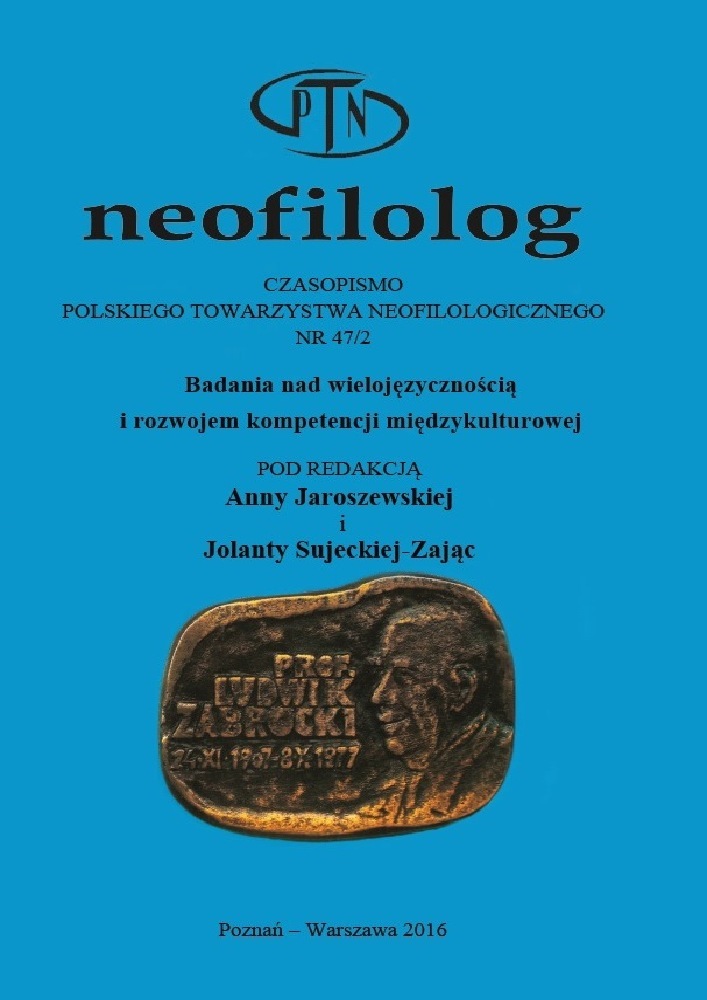Abstrakt
Mind mapping is primarily a learning technique based on creating pictorial notes (Buzan 2003). In the present article, mind maps were used as a tool for the study of social representations, so as to investigate a broad spectrum of ideas, beliefs, and values related to multilingualism. The study involved a group of French Philology students training to become teachers of the French language, and its aim was to determine the extent to which their initial representations of multilingualism were consistent with the theoretical assumptions of the Council of Europe’s language policy. This policy encourages teachers of foreign languages to develop multilingual competence among students. The analysis of mind maps and the transcription of the group interview leads to the conclusion that the respondents show some areas of ignorance and stereotypical beliefs that should be reflected upon in the course of their further education preparing them to the teaching profession.
Bibliografia
Albarello L. 2012. Apprendre à chercher. Bruxelles: De Boeck.
Beckett A. 2010. „Exploring Mind-Mapping as a Research Tool: from application to analysis”. Wykład wygłoszony podczas konferencji „Thinking Critically About Analysis”, University of Leeds, 13.09.2010. [online: http://www.sociology.leeds. ac.uk/assets/files/research/events/A%20Beckett%281%29.pdf; DW: 10.06.2015].
Buzan, T., Buzan, B. 2003. Mapy Twoich myśli. Łódź: Wydawnictwo Ravi.
Candelier, M. (i in.). 2007. CARAP Cadre de Référence pour les Approches Plurielles des Langues et des Cultures. Conseil de l’Europe.
Chłopek, Z. 2011. Nabywanie języków trzecich i kolejnych oraz wielojęzyczność. Aspekty psycholingwistyczne (i inne). Wrocław: Wydawnictwo Uniwersytetu Wrocławskiego.
Europejski System Opisu Kształcenia Językowego: uczenie się, nauczanie, ocenianie. 2003. Warszawa: Wydawnictwa CODN.
Farrell, T. 2007. Reflective Language Teaching: From Research to Practice. London: Bloomsbury Academic.
Flick, U. 2011. Projektowanie badania jakościowego. Warszawa: PWN.
Jodelet, D. 1994. Les représentations sociales. Paris: PUF.
Kvale, S. 2012. Prowadzenie wywiadów. Niezbędnik badacza. Warszawa: PWN.
Maurer, B. 2011. Enseignement des langues et construction européenne. Le plurilinguisme, nouvelle idéologie dominante. Paris: Éditions des archives contemporaines.
Meier, P. S. 2007. „Mind-mapping – a tool for eliciting and representing knowledge held by diverse informants”. Social research Update, 52: 1-4. [online: http://www. soc.surrey.ac.uk/sru; DW: 15.06.2015].
Moscovici, S. 1976. La psychanalyse, son image et son public. Paris: PUF.
Rubacha, K. 2008. Metodologia badań nad edukacją. Warszawa: Wydawnictwa Akademickie i Profesjonalne.
Szymankiewicz K., i R. Kucharczyk. 2015. „Kompetencja różnojęzyczna w początkowym kształceniu nauczycieli języka obcego”. Neofilolog, 45(1): 73-86.
Licencja
Prawa autorskie (c) 2018 Krystyna Szymankiewicz, Radosław Kucharczyk

Utwór dostępny jest na licencji Creative Commons Uznanie autorstwa – Bez utworów zależnych 4.0 Międzynarodowe.
Przedstawiany utwór (artykuł) upubliczniany jest na podstawie umowy z autorem i na licencji Creative Commons Attribution-NoDerivatives 4.0 International (CC BY-ND 4.0).
Użytkownicy mają obowiązek podania wraz z rozpowszechnionym utworem, informacji o autorstwie, tytule, źródle (odnośniki do oryginalnego utworu, DOI) oraz samej licencji;
- bez tworzenia utworów zależnych,
- utwór musi być zachowany w oryginalnej postaci.
Uniwersytet im. Adama Mickiewicza w Poznaniu zachowuje prawo do czasopisma jako całości (układ, forma graficzna, tytuł, projekt okładki, logo itp.).
